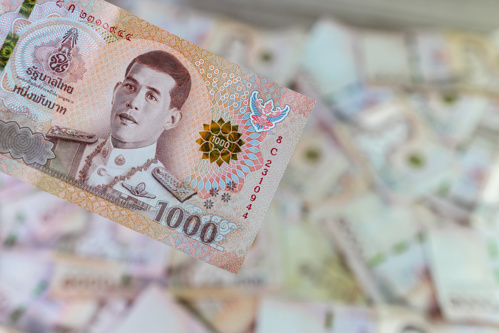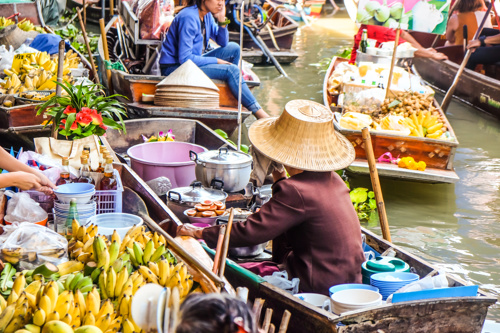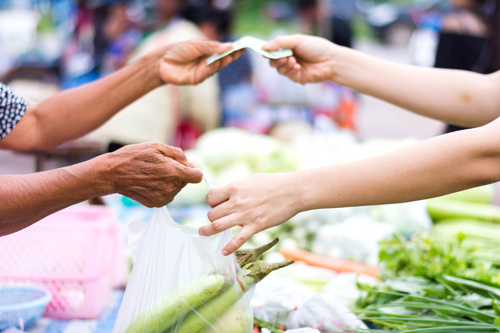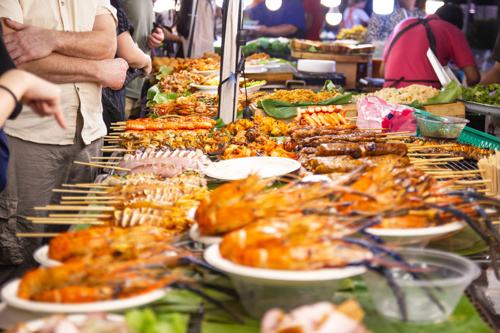The Thai baht is the national currency of Thailand – you’ll see it represented by the currency code THB, and displayed as the ฿ symbol. And if you’re planning a trip here – whether you’re shopping for treasures at a floating market in Bangkok, or tipping at a seafront restaurant in Phuket – it’s a good idea to take some Thai baht with you in cash.
To help you plan how much Travel Money you’ll need, we’ve covered everything you need to know about the Thai currency before your trip. Read on for GBP to THB exchange rates, available payment methods in Thailand and average costs. Plus, you can order Thai baht from Marks & Spencer Travel Money in advance, ready to spend on your trip*.
What currency does Thailand use?

The Thai baht has been Thailand’s official currency since 1897, when it replaced the tical. One Thai baht is made up of 100 satang, and the currency is made up of both coins and banknotes.
Thai baht denominations
Coins include:
25 satang, 50 satang, 1 baht, 2 baht, 5 baht, 10 baht
Banknotes include:
20 baht, 50 baht, 100 baht, 500 baht, 1,000 baht
Is Thai baht used anywhere else in the world?
While Thailand is the only country that has the Thai Baht as its official currency, it’s also widely used in neighbouring countries. That includes Cambodia, Laos and Myanmar, although it’s not the official currency in any of these countries.

What is the current exchange rate for Thai baht?
Exchange rates fluctuate, so the best way to find today’s GBP to THB rate is to take a look at our Thai baht currency calculator. Just type in the amount of Travel Money you’d like in Thai baht, or the amount you’d like to spend in pounds, and you’ll get the most up-to-date exchange rate.* Minimum exchange value applies.
Can you take Thai baht out of the country?
Yes, you can take Thai baht out of Thailand, but only up to the value of 50,000 THB – the equivalent of around £1,220 at the time of writing in October 2025. Any more than this amount will need to be declared at customs.
Can you use other currencies in Thailand?
When you’re travelling around Thailand it’s likely you’ll notice that other major currencies – like US dollars and euros – are accepted by some businesses. That’s particularly true in popular tourist areas and places like hotels and restaurants.
However, it’s likely that any prices you see displayed in these currencies include a mark-up and you’ll be paying more if you choose anything other than Thai baht. Always check before you purchase, and if you’re not sure, bear in mind that it’s usually best to pay in the local currency if you’re given multiple options – particularly if you’re paying by card.

What payment methods are accepted in Thailand?
Cash, card and digital payment methods are all used in Thailand, particularly in major tourist hubs like Bangkok. Digital and card payments may be more tricky in up-and-coming areas, where cash tends to be king, so it’s wise to have multiple payment options – wherever you’re heading to.
Cash
According to data at the time of writing, cash is the leading payment method in Thailand and accounts for around 46% of transaction value in the country. While digital payments are becoming increasingly popular across the board, particularly in larger cities and established beach resorts, cash is still the norm – particularly for tourists – at markets and street food stalls, as well as at smaller shops and restaurants in rural areas.
Debit, credit and prepaid cards
Major credit and debit cards including Visa, Mastercard and American Express are widely accepted in Thailand, although this will depend to a degree on where you’re staying. You’re unlikely to have any problems paying by credit or debit card in Bangkok, for example, but you may struggle to pay by card for anything on a remote Thai island – so it’s a good idea to always carry some cash.
Whenever you pay by credit or debit card, bear in mind that many providers charge a non-sterling transaction fee for using your card abroad, as well as a cash advance fee if you’re withdrawing cash from an ATM. Always check before you travel to avoid any surprises.

Digital wallets
Digital payments are increasingly common in Thailand, partly due to a push by the country’s central bank to reduce the amount of cash in circulation. PromptPay, a QR code-based payment method backed by the Thai government, has become the most-used payment method – and you’ll notice many locals pay this way.
While this option requires a Thai bank account and is therefore more popular with longer-term visitors, some holidaymakers choose to register for a digital tourist wallet or prepaid card that supports QR payments across Thailand. That’s because some popular digital payment methods aren’t available – Thailand, for example, isn’t listed as one of the countries and regions supported by Apple Pay. And while Google Pay is accepted at large retailers and establishments, its availability is intermittent elsewhere in the country.

How much money should I take with me?
As the cost of living in the UK is around 77.5% higher than it is in Thailand at the time of writing, you’re likely to find your money goes significantly further in Thailand. We’ve compared some average costs below in pounds to give you an idea – just bear in mind that these prices are illustrative.
- A mid-range three-course meal for two: £65.00 in the UK vs £20.93 (900 THB) in Thailand
- A small domestic draught beer: £5.00 in the UK vs £1.63 (70 THB) in Thailand
- A regular cappuccino: £3.46 in the UK vs £1.58 (67.92 THB) in Thailand
- A one-way ticket on local transport: £2.50 in the UK vs 58p (25 THB) in Thailand
*Example prices from Numbeo.com correct as at September 2025.
Do I need to tip in Thailand?
While it’s not mandatory, tipping in Thailand is common – whether it’s rounding up your bill or leaving some change after a meal. At larger restaurants a 10% service charge may automatically be added to your bill.
Are card payments accepted at markets in Thailand?
As a general rule, cash payments are preferred at Thailand’s many markets. While some vendors at established markets might be set up to accept card payments, most aren’t, so it’s a good idea to carry some cash in Thai baht if you’re planning a shopping trip.
Buying Thai baht with M&S Travel Money
Ready to go to Thailand? Order your Thai baht online for Click & Collect with no commission and no hidden fees*.
*T&Cs apply. Subject to availability.
